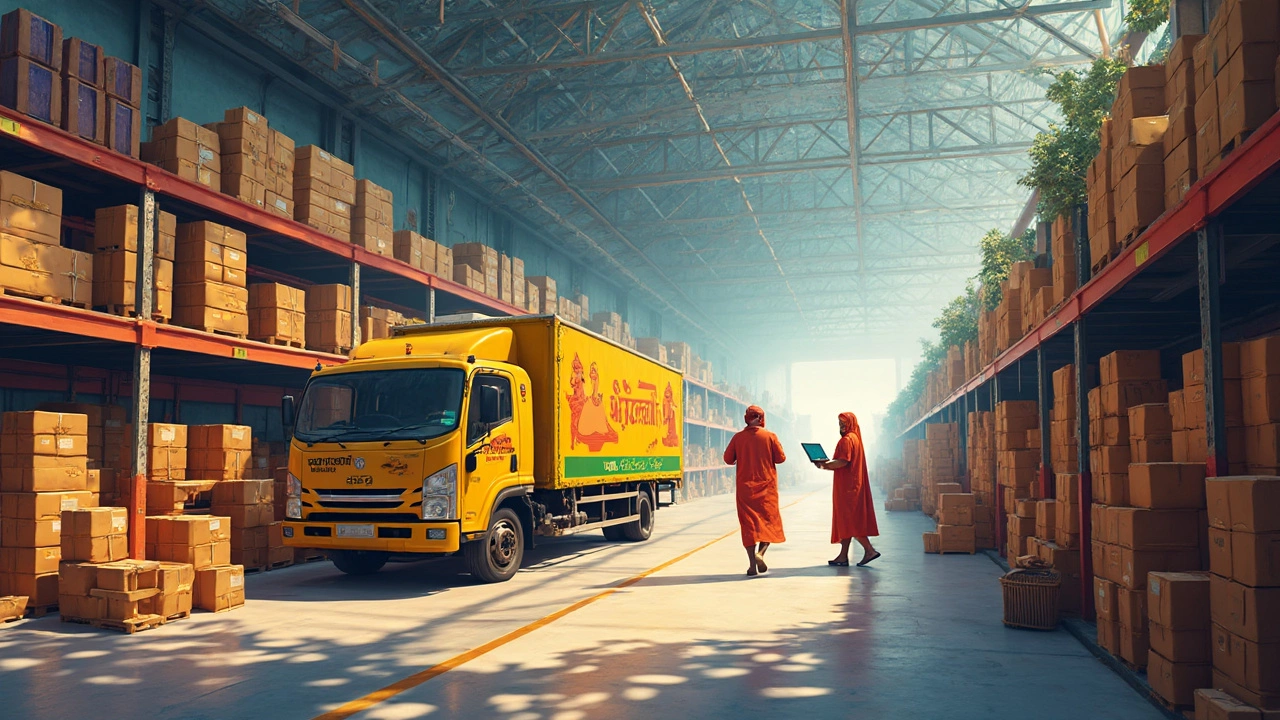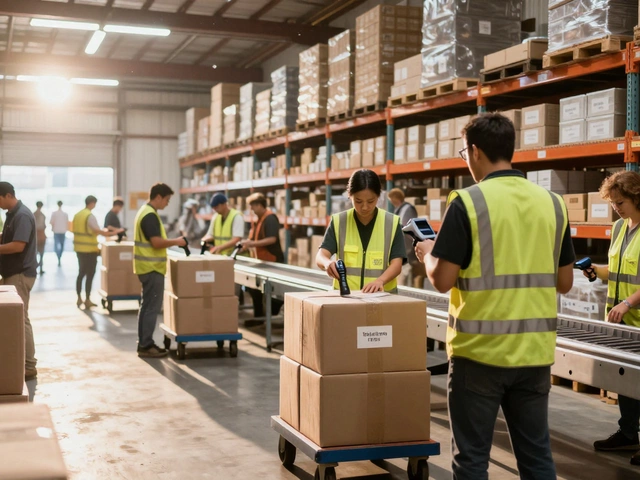Have you noticed how everything seems to be just a click away these days? You can buy almost anything online, and it arrives at your doorstep faster than you'd expect. Yep, that's logistics working its magic. But what's driving the soaring demand in logistics?
The digital age has transformed shopping habits, with e-commerce setting new sales records globally. This change means logistics companies need to adapt, moving faster and smarter to keep up with customer expectations. Plus, globalization keeps on breaking boundaries; businesses are stretching their supply lines to every corner of the earth, adding even more fuel to the logistics industry engine.
- Current Demand in Logistics
- Factors Driving Growth
- Challenges in Logistics
- Future Trends
- Tips for Entering the Industry
- Conclusion
Current Demand in Logistics
Right now, the logistics sector is buzzing. There's been a massive increase in online shopping, especially since the world hit the fast-forward button on e-commerce during the pandemic. This move to digital commerce means logistics had to step up their game real quick. A lot of people don't realize it, but behind every next-day delivery sits a small army of trucks, warehouses, and staff working with a tight schedule.
Take a look at some numbers: e-commerce sales crossed $5 trillion globally in 2024, and it's only growing. The magic behind these figures? Logistics. It's not just about packages anymore; it's about the speed at which they move, the accuracy of tracking, and the efficiency in handling returns.
Why Logistics is So Hot Right Now
The rise in integrated supply chains is another biggie. Businesses are realizing that every second counts, so they're optimizing their supply chains to chop down lead times and cut costs. This optimization isn't some fleeting trend either—it's the new standard. And it's why skills in supply chain management and logistics are sought after.
Meanwhile, sustainability is creeping up the priority list. With climate change on everyone's mind, companies in logistics are pressured into ‘greener’ practices. Whether it's reducing carbon footprints or using electric delivery vans, these changes are reshaping the industry.
A Quick Look at Data
Let’s look at a snapshot of logistics employment:
| Year | Logistics Jobs |
|---|---|
| 2022 | 1.9 million |
| 2024 | 2.2 million |
See the jump in jobs? It’s clear the demand isn't just high; it's growing. If you've got a knack for logistics, there's never been a better time to jump in.
Factors Driving Growth
So, what exactly is pushing the demand for logistics through the roof? Let's dive into some key drivers making this industry hotter than ever. And spoiler: it's not just online shopping.
E-commerce Explosion
First off, there's the obvious star of the show: e-commerce. With more folks shopping online today than ever, logistics teams are scrambling to deliver packages quickly and efficiently. Companies like Amazon and Alibaba have set sky-high standards, and others are hustling to catch up.
Globalization
Then there's globalization. It's not a new kid on the block, but its influence on the supply chain has never been stronger. As companies expand into new markets, strings are pulled across continents, making smooth and fast transportation services crucial.
Tech and Automation
Technology is another game-changer. With AI and machine learning, logistics firms are getting super smart. They're predicting demand, optimizing routes, and reducing waste like never before. Heard of drones and self-driving trucks? They're not just sci-fi anymore.
Changing Demographics
Lastly, we’ve got shifts in demographics. Urban populations are growing, and people are living busier lives. Expecting quick deliveries is becoming the norm. So logistics has to step up to keep city slickers happy.
Some Numbers
To put it in perspective, did you know the global logistics market is projected to hit over $12 trillion by 2027? That's more than a savvy investment; it's a necessity in our connected world.
Challenges in Logistics
Navigating the world of logistics isn't always smooth sailing. Companies face several hurdles, often requiring innovative solutions to keep things moving. Let's break down some of the key challenges in this logistics boom.
Rising Fuel Costs
Fuel prices can make or break a company's budget. With price hikes becoming a constant headache, logistics firms must find ways to optimize routes and fleet efficiency. Some are turning to alternative fuels or investing in more fuel-efficient vehicles to soften the blow.
Skilled Labor Shortage
There’s a growing need for skilled workers to handle the complexities of modern supply chains. However, attracting and retaining talent isn't as easy as it sounds. Companies are looking to attract new talent through competitive pay and opportunities for career growth while also automating certain processes to mitigate the impact of workforce shortages.
Regulatory Compliance
Regulations vary by region and can significantly impact supply chain operations. Staying compliant is crucial, but it often means dealing with mountains of paperwork and adjustments to procedures. Many firms are investing in technology to streamline compliance and minimize disruptions.
Technological Adaptation
The tech landscape is changing rapidly, and logistics players must stay ahead of the curve or risk falling behind. From blockchain to AI, adopting new tech can be costly and challenging, but it's necessary for maintaining efficiency and competitiveness.
Unpredictable Factors
And then there are factors like weather conditions, global events, or sudden shifts in market demand. These unpredictable elements can throw a wrench in even the best-laid plans. Having a flexible strategy and robust disaster recovery plans helps cushion the blow.
| Year | Global Logistics Cost (Trillion USD) |
|---|---|
| 2022 | 8.6 |
| 2023 | 9.1 |
| 2024 | 9.7 |
Dealing with these challenges requires resilience and innovation. By understanding what's at play, logistics companies can equip themselves better to tackle the twists and turns of this dynamic industry.

Future Trends
The logistics industry is racing forward, brimming with exciting changes. Let's talk about the tech that's shaping this field and peek into some cool trends that are making waves.
1. Automation and AI
Robots in warehouses? It's not just science fiction. Automation is becoming a logistics game-changer. With advancements in AI, logistics companies can predict demands better, optimize routes, and even streamline warehouse operations. The idea is all about efficiency—doing more with less, faster.
2. Green Logistics
Environmental concerns aren't just for the hippies anymore; they're a big deal in logistics, too. Companies are leaning towards eco-friendly practices, exploring electric vehicles for transportation, and reducing waste. This shift not only meets consumer demand for greener choices but also slashes costs in the long run.
3. Blockchain in Supply Chains
Trustworthiness in supply chains is essential. Enter blockchain. It's making tracking products a whole lot easier and helps verify the authenticity of goods. Imagine knowing exactly where your avocado came from and the journey it took. Yep, that's the blockchain advantage.
4. Global Expansion
Markets are growing beyond borders, and supply chain networks are spreading out like never before. There's a push for reaching untapped areas, bringing logistics to every nook and cranny of the globe. With this, the logistics landscape will become more diversified and resilient.
- Adoption of autonomous delivery vehicles.
- Increased use of 3D printing for on-demand production.
- More personalized delivery options.
- Growing focus on cybersecurity to protect sensitive data.
Okay, so what's next? Keep an eye on these trends, as they reveal where the industry is headed. Whether you're in the business or just fascinated by how stuff gets from A to B, these developments are sure to shake up the logistics world.
Tips for Entering the Industry
Jumping into the logistics industry can be a smart move, but where do you start? First, understand the essentials. Having a clear grasp of the supply chain, transportation methods, and digital platforms can set you on the right path.
Get Educated
Consider enrolling in courses or workshops on logistics and supply chain management. Many online platforms offer certifications that aren’t just affordable but also flexible with your schedule. These courses often cover the nitty-gritty details you need to know.
Network Like It's Your Job
Networking is a huge deal. Attend industry events, conferences, or even webinars to meet professionals in the field. LinkedIn can also be a handy tool to connect with others and learn from their experiences.
Start Small, Think Big
Don't shy away from entry-level positions. Gaining hands-on experience is invaluable. Whether it's a role in transportation management or warehouse operations, each job can provide insights into how the industry ticks. And who knows, your first job could lead to bigger opportunities!
Stay Updated
Logistics is an industry that never sleeps. With constant technological advancements, it's key to stay updated. Subscribe to industry newsletters or follow logistics blogs to keep current with trends and innovations.
Understand the Impact of Tech
Technology is reshaping how logistics companies operate. Familiarize yourself with the latest software and tools used in logistics, such as Inventory Management Systems and GPS tracking. A hand-in with tech is a huge plus.
Consider Specializing
Once you’re in, think about specializing. Whether it's focusing on sustainable logistics, a niche in transportation, or cybersecurity in logistics, having a specialized skill can make you stand out.
Logistics, as an industry, might feel like a big ship to steer, but with the right skills, knowledge, and attitude, you can navigate it well. Follow these tips, stay curious, and you'll find plenty of opportunities waiting for you.
Conclusion
It's clear that logistics is not just a backbone of the economy but a thriving lifeline that's evolving faster than ever before. With e-commerce booming and supply chains stretching across the globe, the demand for skilled logistics professionals is at an all-time high.
One of the driving forces behind this surge is technology. From artificial intelligence managing inventory to drones and autonomous vehicles speeding up deliveries, technology is reshaping the logistics landscape. Staying updated with these advancements is crucial for anyone in the industry.
Let’s also not forget the challenges. With sustainability becoming a priority, logistics companies are working hard to reduce carbon footprints and adopt greener practices. It's an exciting time to be involved, as these changes offer both challenges and opportunities.
For those considering entering the logistics field, now is the perfect time. Embrace new skills, stay adaptable, and be ready to innovate. The future of logistics is not just about moving things from point A to B but doing it smarter and more efficiently than ever before.
Remember, being a part of this rapidly growing industry means you'll be contributing to a vital part of the global economy, connecting people and products in ways that keep the world running smoothly.





